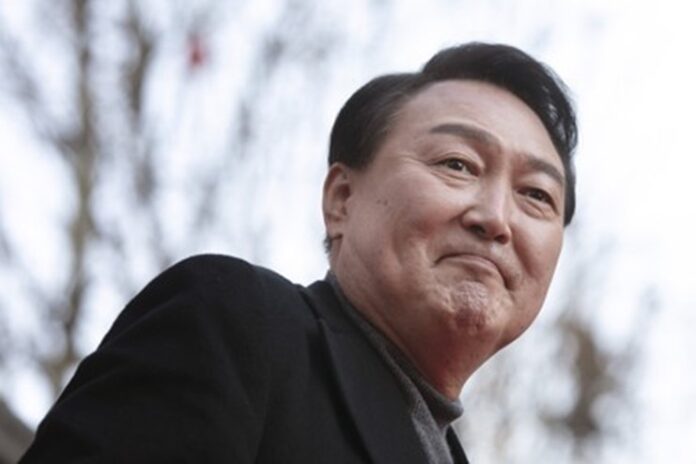People Power Party candidate Yoon Suk-yeol has been elected as the 20th president of South Korea, defeating Democratic Party candidate Lee Jae-myung by just 0.73% of the vote. Because Yoon has consistently pushed a hard-line policy against North Korea, inter-Korean tensions are likely to continue. However, some observers are looking forward to the new administration taking “principled and consistent” measures for denuclearization.
In summary, Yoon’s denuclearization policy is:
- Complete and verifiable North Korean denuclearization
- Putting forth a predictable roadmap for denuclearization
- Principled corresponding measures for substantive North Korean moves toward denuclearization
- Establishment of a tripartite liaison office between the two Koreas and the US
“Prior denuclearization”: Doomed to fail from the start?
Some observers criticize that a North Korea policy that prioritizes “prior denuclearization” — that is to say, demanding North Korea denuclearize before corresponding measures are taken — will not only escalate inter-Korean tensions, but also prevent the adoption of substantive measures. However, experts note that flexibly adopting corresponding measures regarding North Korea or offering inducements to North Korea prior to denuclearization does not necessarily bring North Korea to the negotiating table, either.
Oh Gyeong Seop, a researcher at South Korea’s Korea Institute for National Unification, told Daily NK in a telephone conversation that it was narrow minded to say insisting on denuclearization as a priority would prevent dialogue with North Korea. He said in the past, North Korea engaged in dialogue whenever it needed to, even when inter-Korean relations were tense.
In fact, even after the UN Security Council placed very tough sanctions on North Korea in 2017, North Korean leader Kim Jong Un met with South Korean President Moon Jae-in in Panmunjom on Apr. 27 of the following year. Then he held his first summit meeting with US President Donald Trump on June 12.
With the second summit with Trump ending in failure in Hanoi in February 2019, Kim apparently lost face, but he still acceded to the US president’s proposal for a brief meeting in Panmunjom in July.
“We must view it as unavoidable if North Korea rejects dialogue, thus using dialogue itself as a tool to achieve its ends,” Oh said. He noted that a failure to make denuclearization a priority, or offering inducements beforehand, to bring North Korea to the negotiating table has the negative effect of losing a way to encourage North Korea to denuclearize.
The first step: North Korean denuclearization, not “Korean denuclearization”
Park Won Gon, a professor of North Korean studies at Seoul’s Ewha University, told Daily NK that for the US, North Korea must develop ICBMs or worse to cross a “red line,” but for South Korea, the red line has already been well and truly crossed. He said the Korean peace process cannot proceed without prioritizing denuclearization.
Park said policy makers must redefine “denuclearization” away from the “denuclearization of the Korean Peninsula” as expressed in the joint statement following the first US-DPRK summit in Singapore. He said it is very important to clearly redefine the meaning and goals of denuclearization, even if this takes a long time.
North Korea claims “denuclearization of the Korean Peninsula” means not the complete, verifiable and irreversible dismantlement (DVID) of its nuclear program, but the withdrawal of US forces from South Korea and the removal of the US nuclear umbrella. Because of this, North Korea has openly pursued nuclear development employing this “double standard.”
Actively raising the long-ignored human rights issue
One of the hopes pinned on the incoming South Korean administration is that it will actively seek to improve North Korean human rights. Indeed, Yoon has pledged that South Korea will jointly sponsor UN resolutions criticizing North Korean human rights.
The Moon Jae In government, on the other hand, abstained from such resolutions.
To avoid provoking North Korea, the Moon government refused to participate in three consecutive joint statements by the international community condemning North Korean missile provocations. It also refused to sponsor UN resolutions condemning North Korean human rights for three straight years.
Oh said he expects the new South Korean administration will engage in principled, active responses to several matters regarding the North, including the nuclear issue, human rights, and humanitarian aid.
Strengthening US security cooperation, but choices remain
Meanwhile, President-elect Yoon has long said he will strengthen South Korean security based on the country’s alliance with the US in a time of renewed hegemonic competition with the Russian invasion of Ukraine and tensions between the US and China.
The South Korean government — which pursues security cooperation with the US and its allies while economically cooperating with China and Russia — now faces a choice between security and the economy.
Park said South Korea can no longer walk the tightrope of strategic ambiguity. He advised that Seoul make principled choices and pay the price of those choices, zero-sum game notwithstanding.
Some observers worry that if Seoul takes part in a US-centric security order, it could bring a “new Cold War” structure further into being by intensifying cooperation between anti-American nations such as North Korea, China, and Russia. However, experts say that North Korea, China and Russia face real difficulties in engaging in substantive military cooperation.
Oh said China and Russia could grow closer, but there are fundamental limits that prevent such cooperation from reaching the level of the US-ROK alliance. He said the bigger problem was potential economic retaliation, and that Seoul’s diplomatic task going forward is deciding how closely to cooperate with the US and Japan while defining its relationship with China.
Please direct any comments or questions about this article to dailynkenglish@uni-media.net.


















